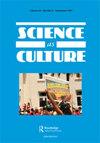海岛幻想:专题导论
IF 2.5
3区 哲学
Q1 CULTURAL STUDIES
引用次数: 7
摘要
长期以来,殖民帝国、科学家、慈善家和好莱坞电影公司一直将岛屿视为拥有独特生态和文化、实验实验室或逃避现实场所的偏远地区。气候危机和2019冠状病毒病大流行促使人们普遍认为,岛屿既是特殊空间,也是可以扩展到大陆或全球层面的试验台。同样,岛屿的隐喻是西方思想的基础,但在科学进程和技术发展的背景下却很少被探索。将科学和技术研究(STS)与关键的岛屿研究和相关领域结合在一起,这一特殊部分扩展了社会技术想象的空间维度,将岛屿及其想象视为既存在又引导科学和技术的愿景。引入的岛屿想象概念捕捉了岛屿愿景的相互构成及其在科学,技术和技术官僚努力中的物化,这些努力是由科学界,决策者和其他社会集体想象和追求的。这种方法探索了岛屿作为技术科学知识制度基础的共同构成动力,以及岛屿作为有利于发现和实验的地方的伴随呈现。特别部分提供了实证案例研究,对岛屿作为更大整体(地球)的喻喻,作为试验商业创造和政治秩序的实验和特殊场所(在新加坡和亚洲),以及作为各种解释的实验室天堂(夏威夷)的见解进行了深入研究。结语部分提出了进一步研究STS的主题。本文章由计算机程序翻译,如有差异,请以英文原文为准。
Island Imaginaries: Introduction to a Special Section
ABSTRACT Colonial empires, scientists, philanthropists and Hollywood studios have long sustained an image of islands as remote places with unique ecologies and cultures, experimental labs, or loci of escapism. The climate crisis and the Covid-19 pandemic have contributed to a predominant view of islands as both exceptional spaces and testbeds to be scaled up onto continental or planetary levels. Likewise, the metaphor of the island is foundational to Western thought yet has been less explored in the context of scientific processes and technology development. Bringing together science and technology studies (STS) with critical Island Studies and related fields, this special section expands upon the spatial dimension of sociotechnical imaginaries to consider islands and their imaginations as both preexisting and channeling visions of science and technology. The introduced concept of Island Imaginaries captures the mutual constitution of island visions and their materialization in scientific, technological and technocratic endeavors that are imagined and pursued by scientific communities, policymakers, and other social collectives. Such an approach explores the co-constitutive dynamic of islands as sites for the foundation of technoscientific knowledge regimes, and the concomitant rendering of islands as conducive places for discovery and experimentation. The special section offers empirical case studies with insights into islands as synecdoche for larger wholes (the Earth), as experimental and exceptional sites for trialing business creation and political orders (in Singapore, and for Asia), and as variously interpreted laboratory paradise (of Hawai‘i). Further research themes for STS are suggested in the Conclusion.
求助全文
通过发布文献求助,成功后即可免费获取论文全文。
去求助
来源期刊

Science As Culture
Multiple-
CiteScore
5.20
自引率
3.80%
发文量
28
期刊介绍:
Our culture is a scientific one, defining what is natural and what is rational. Its values can be seen in what are sought out as facts and made as artefacts, what are designed as processes and products, and what are forged as weapons and filmed as wonders. In our daily experience, power is exercised through expertise, e.g. in science, technology and medicine. Science as Culture explores how all these shape the values which contend for influence over the wider society. Science mediates our cultural experience. It increasingly defines what it is to be a person, through genetics, medicine and information technology. Its values get embodied and naturalized in concepts, techniques, research priorities, gadgets and advertising. Many films, artworks and novels express popular concerns about these developments. In a society where icons of progress are drawn from science, technology and medicine, they are either celebrated or demonised. Often their progress is feared as ’unnatural’, while their critics are labelled ’irrational’. Public concerns are rebuffed by ostensibly value-neutral experts and positivist polemics. Yet the culture of science is open to study like any other culture. Cultural studies analyses the role of expertise throughout society. Many journals address the history, philosophy and social studies of science, its popularisation, and the public understanding of society.
 求助内容:
求助内容: 应助结果提醒方式:
应助结果提醒方式:


